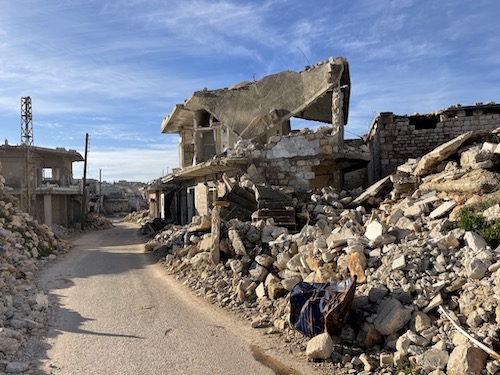Communiqué
Called Terrorist by the U.S., Now Seeks Relationship with the West: “The Jihadist” on FRONTLINE. June 1 at 10pm
< < Back toFRONTLINE Investigates the Fight Over the Future of Syria, and Interviews a Former Al Qaeda Leader Who Now Seeks Wider Acceptance
The Jihadist
Tues., June 1, 2021 at 10 pm on WOUB and on YouTube
Streaming at 7/6c at pbs.org/frontline & in the PBS Video App
www.facebook.com/frontline | Twitter: @frontlinepbs
Instagram: @frontlinepbs | YouTube: youtube.com/frontline
More than 10 years and hundreds of thousands of deaths into the Syrian conflict, Syrian President Bashar al-Assad remains in power.
In a new documentary, FRONTLINE correspondent Martin Smith travels to Syria’s Idlib province, the last remaining opposition stronghold to the Assad regime, to investigate the fight over the future of the country — including by asking tough questions of one of the most wanted men in the world: Abu Mohammad al-Jolani, leader of the most dominant force in opposition-held Syrian territory, in his first interview with an American journalist.
“The U.S. has labeled Jolani a terrorist since 2013 and offered a $10 million reward for information leading to his capture,” says Smith, who has been covering the Syrian conflict for years (Obama at War, Confronting ISIS, Inside Assad’s Syria). “I asked him why people should consider him as a leader in Syria if he has been designated a terrorist by the U.S., other countries, and the United Nations.”

Smith’s conversations with Jolani, his critics and his victims unfold in The Jihadist, a documentary premiering Tues., June 1, on PBS and online. In the film, Smith examines Jolani’s emergence as a leading Islamist militant and his efforts — despite his history with Al Qaeda and allegations of human rights abuses — to change his image into that of a viable leader who presents no threat to the United States and Europe.
As the documentary reports, over most of two decades, Jolani’s life has been a roadmap of Islamist militancy in Iraq and Syria. He joined the fight against U.S. forces in Iraq and was jailed by the Americans. He became a commander within the group known as the Islamic State of Iraq. He founded an Al Qaeda affiliate in Syria and then broke with Al Qaeda and ISI, striking out with his own group to oppose Assad.
Today, from his base in the northwestern corner of the country, he and his organization have fought against Assad’s forces, Assad’s Russian and Iranian allies, and Jolani’s own former allies in ISIS and Al Qaeda. In Idlib, his group has worked to establish a civic authority through a self-described “salvation government.” Idlib has become home to more than 3 million civilians, many of whom fled other parts of Syria.
Jolani told Smith that his role in fighting Assad and ISIS, and in controlling an area with millions of displaced Syrians who could potentially become refugees, reflected common interests with the United States and the West. He said that his group, Hayat Tahrir al-Sham, does not see the United States as an enemy and that the government should remove him from its list of designated terrorists.
“We did not pose any threat to western or European society. No security threat, no economic threat… nothing,” Jolani tells Smith, despite his history.
Smith’s reporting cast doubt on Jolani’s assertions that his forces have not targeted civilians or imprisoned and tortured his critics. But Smith also found that U.S. experts and veteran diplomats in the region credit Jolani with establishing a semblance of stability in Idlib province and acting as a buffer against forces hostile to the United States.
James Jeffrey, a top diplomat in the region during the Bush, Obama and Trump administrations, thinks it may be wise to work with with Jolani.
“Look, he’s the least bad option of the various options on Idlib, which is one of the most important places in Syria, which is one of the most important places right now in the middle East,” Jeffrey told Smith.
Since the start of the conflict in Syria a decade ago, the Assad regime’s forces and ISIS have conducted large-scale human rights abuses. The Assad regime’s actions, Jolani told Smith, fit the definition of terrorism because it was “killing innocent people, children, poor people, women.”
As the documentary explores, human rights organizations have also documented violations by Hayat Tahrir al-Sham and its earlier incarnations, from indiscriminate attacks on civilian areas, to torture, to arbitrary arrests of civilians who criticized the group.
As Jolani seeks wider acceptance from the global community and the fate of Syrians living in Idlib hangs in the balance, The Jihadist offers a hard look at his past, his ascent and his aspirations.
“Jolani has gone where the wind has blown, in many respects, over time to try and survive different challenges that have come up at various points within the last 10 years,” Aaron Y. Zelin, whose research at the Washington Institute for Near East Policy focuses on jihadi groups in North Africa and Syria, tells Smith. “How can you necessarily trust somebody that’s just trying to survive and continue to remain in power, because that’s the only way he can?”

